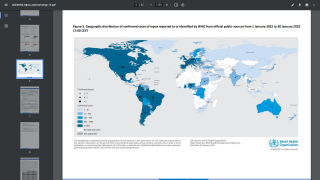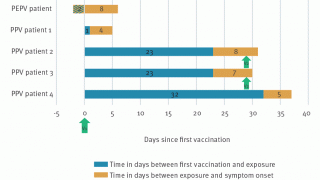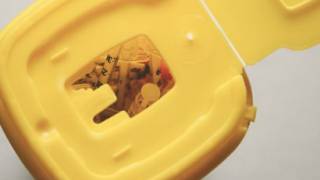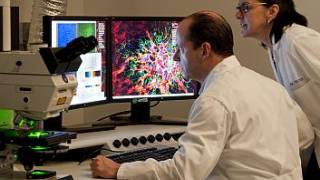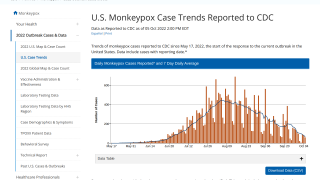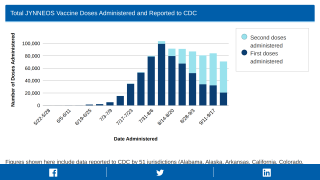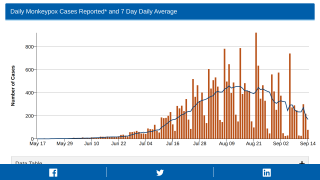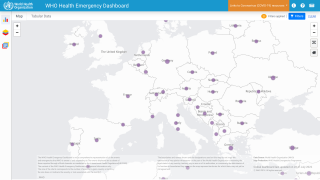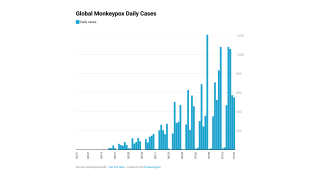Monkeypox Virus Detected in Nonhuman Primate Testes

For the first time, scientists have detected the monkeypox virus (MPXV) in the testes of macaques, according to research published in the journal Nature Microbiology.
In addition, these researchers found preliminary evidence of persistent infection in two animals that survived challenges with the virus.
This data provide evidence that MPXV may be shed into semen during both acute and convalescent stages of the disease.
Their results, published on October 17, 2022, highlight the potential for sexual transmission of the MPXV in humans.
Investigators at the U.S. Army Medical Research Institute of Infectious Diseases (USAMRIID) performed a retrospective analysis of monkeypox virus infection in archival tissue samples from crab-eating macaques—a widely used nonhuman primate model for studying the disease and evaluating the efficacy of medical countermeasures, such as vaccines and treatments, against monkeypox.
“We examined tissue samples obtained during both the acute phase of the disease when an infection is at its peak, and the convalescent phase, when an infection is gradually subsiding,” explained senior author Xiankun (Kevin) Zeng, Ph.D., of USAMRIID, in a related press release.
“We detected monkeypox virus in interstitial cells and seminiferous tubules of the testes, as well as the epididymal lumina, which are the sites of sperm production and maturation.”
Importantly, said Zeng, the team also found preliminary evidence of persistent monkeypox virus infection in two convalescent crab-eating macaques that survived challenge with the virus.
Using histological analysis to microscopically analyze the disease course in tissue samples, the USAMRIID team discovered that while the MPXV was cleared from most organs—and healed skin lesions—during recovery, it could be detected for up to 37 days post-exposure in the testes of the macaques.
USAMRIID investigators, led by Zeng, had previously demonstrated that Ebola, Marburg, Nipah, and Crimean-Congo hemorrhagic fever viruses could persist in specific organs of nonhuman primate survivors where the immune system is suppressed.
These immune privileged sites, similar in humans, include the eyes, brain, and testes.
While close contact through sexual activity has been associated with the spread of MPXV in the current global epidemic, it was unclear whether the virus replicated in the testes or was transmitted via semen.
“Our data provide evidence that monkeypox virus may be shed into semen during both acute and convalescent stages of the disease in crab-eating macaques,” added Zeng.
“It seems plausible, therefore, that human transmission in convalescent male patients might occur via semen.”
Because this was a retrospective study using archival tissues, virus isolation in semen was not possible, said Jun Liu, Ph.D., the paper’s first author.
Further studies are needed to understand the origins, dynamics, and implications of viral DNA shed in semen and confirm whether semen from convalescent monkeypox patients contains an infectious virus—especially after skin lesions heal.
In addition, according to the authors, the crab-eating macaque model may not fully reflect monkeypox in humans.
USAMRIID has decades of experience working with monkeypox and related high-threat pathogens.
Among the Institute’s many contributions to the field is a novel respiratory model for monkeypox that closely approximates human exposure and clinical disease:
- The Phase 3 clinical trial supporting U.S. FDA licensure of the JYNNEOS vaccine for preventing smallpox and monkeypox in humans;
- The initial screening and preclinical efficacy testing of TPOXX, the first drug approved for the treatment of smallpox;
- USAMRIID continues to develop monoclonal antibodies and other approaches to protect against orthopoxviruses.
Since 1969, USAMRIID has provided leading-edge medical capabilities to deter and defend against current and emerging biological threat agents. For more information, visit USAMRIID.
Additional monkeypox vaccine and outbreak news are posted at Monkeypox Today.
PrecisionVaccinations publishes fact-checked, research-based vaccine news manually curated for mobile readers.
Our Trust Standards: Medical Advisory Committee

